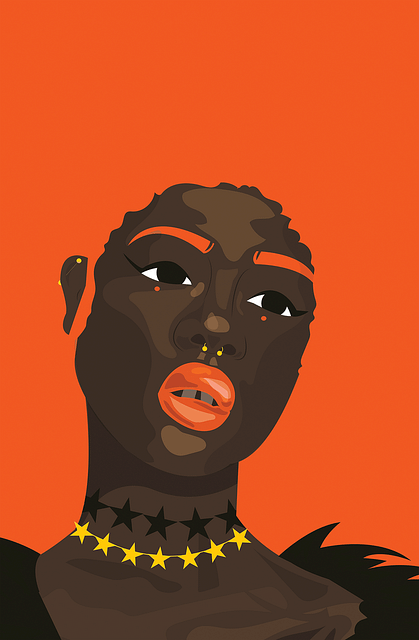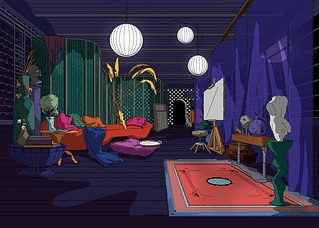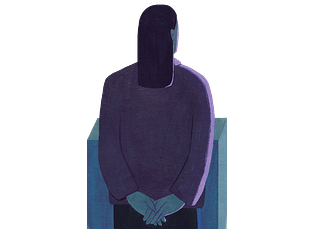
You said the two of you were closer than a person and their skin. “The love was sweet, unnaturally saccharine to a pancreas-punching degree — the stomachache was bound to come later.” You said it like that: cool, simultaneously deflective and reflective, as if it were a wound you’d suffered long ago, a hurt that motivated a monkish search for nirvana. I know you want a chambré retelling of this story — you liked a girl, it didn’t work out, life loped along after your loss — but I have only the piping-hot truth for a scalding cup of tea.
Unlike many people, I know you’re a coward.
Aqeesha. Bestrewn with starry freckles. A Medusa head of brown curls. Denim torn at the knees. A lover of the only thing that made sense when your hormones hit new highs in high school: rock music.
Classic, hard, glam, blues, surf, garage, acid, psychedelic, punk, alternative, and nu-metal. All of rock’s species were your refuge. You were lost to its rhythms and rhymes, forever a bondsman to its beats. Its bass notes thrummed past the topsoil of your being, cracking the calm mantle of your childhood, rearing the jagged crusts of teenage rebellion.
Rock nearly drove your parents mad.
“The boy is lost in that filth,” your mother said when the music started up at volume.
“Il est malade,” your father replied.
The Columbine massacre put parents everywhere — even old-school African ones like yours, who believed school shootings were “white people things” — on high alert. If rock music could corrupt white kids, then a Black child stood no chance at all. Those were watchful days for parents with teenage sons. Everyone worried about sullen isolations. Certain precautions prescribed by Drum and You magazines were taken: heavy metal was genre non grata, and long coats of any kind (along with any black T-shirts, sweaters, and hoodies) were taken as a sign. It goes without saying that anything with skulls was non licet. Quake, Duke Nukem, and Doom were purged from computers. You weren’t allowed to watch The Silence of the Lambs in case it gave you funny ideas. Your parents were on the qui vive for antisocial behavior as soon as they heard your bedroom door almost vibrating off its hinges when you brought home Limp Bizkit, System of a Down, and Papa Roach.
Could you blame them? They liked things nice and slow. Your father loved Sam Cooke. Your mother enjoyed Roy Orbison. The new mutations of rock reminded them how adrift they were from what they knew, what was, and what couldn’t be again as the upheaval of their lives went on. They were never given enough time to adjust to the tempo of the times wherever they landed — their immediate concern was securing stability for you and your brother in each new country. They worked hard and long. All they wanted when they got home was a soothing jingle, not screeching reminders of the cruel rush and assault of the present.
Things finally came to a head when your mother thumped on your bedroom door and walked in without waiting for an answer.
“Shut it down now! We have had enough! No more rock music in this house!”
Like many mothers, yours was the recipient of spit-laden gurgles when you were a baby and your universe revolved around her nipples. When you chewed her up and passed her on to your younger brother, you showered her with giggles. When you were five, after you’d discovered crayons, she became “The Most Funest Mom In The Hol Wyd World” and “The Lavliyest Mom,” titles she’d hold undisputedly until you turned eleven. The last time she’d command your automatic affection was when you gave her a card that said she was “Simply the Best, Better Than All the Rest,” which you’d hoped to give to a potential but failed valentine. You were thirteen and tumbling into your troubled teens.
When your room was tossed into silence, your eyes narrowed, your lips sneered. Your mother walked out slowly. You’d made her feel loved and cherished in the past, and annoying in the present, but you’d never made her feel afraid.
Your parents doubled their vigilance. The strictures tripled: no locked doors in the house; home by seven, even on weekends; fewer visits from your friends — who were surely bad influences.
They hoped these injunctions would bring you into line. They had no idea how deep the rock malady and melodies went, or how, after you saved for a pair of headphones, you rocked on with them none the wiser. If they couldn’t hear, you wouldn’t listen.
Aqeesha. Two piercings through the left earlobe, a trademark of adolescent revolutionaries back then. You met at a house party on the other side of town — you’d snuck out of your house. She sipped some cheap vodka and Coke in a plastic cup. She and her friends were surrounded by a pack of older boys from another school. She passed by the drinks table where you poured Mountain Dew into a cup, head bobbing along to “Clint Eastwood” by Gorillaz. She saw your T-shirt. “Cool,” she said.
“I’ve seen them — when I was younger.”
An up-down from her. Your age and the band’s life span weren’t adding up: your trap was working. (Maybe the new Men’s Health issue and its shitty pickup advice — “lead with a story with a void she’ll want to have filled in” — was good for something.)
“The real ones,” you said. “In Rwanda.” (A lie — you had seen Gorillaz on MTV but no gorillas in the mist.) Those primates were Small Country’s calling card.
Well, that and the other thing.
Aqeesha started walking away.
“I like yours, too. My favorite is ‘Real World.’” You pointed at her T-shirt. “Matchbox Twenty.”
“I didn’t think anyone got it,” she said, looking down at her T-shirt: a small box, ten matches in, ten out — a Jeopardy! clue for true rock acolytes. You, however, were high priest material.
A tall boy whose size screamed alpha to your skinny beta came to tell her about another party. He’d give her a lift. He looked at you, wondering what you were doing in his presence. Aqeesha introduced you. He left your fist bump hanging and steered her away.
While you and your friends waited for a taxi back across the class divides, Aqeesha materialized from the darkness and asked for your number. You held her phone like the Holy Grail. Your friends prodded you for answers the entire ride home. Your younger brother, a faithful but poorly treated disciple and accomplice to your filial disobedience, opened your bedroom window to let you into the house.
Aqeesha. A sfumato smile with dimples where shadows pooled as you’d exchanged numbers.
She’d sent you a text message already: “Sorry for leaving. Tristan was being unnecessary.”
You replied: “It’s okay. Never met a Tristan who wasn’t an asshole.”
She said she liked meeting you. You said you really liked meeting her.
She said the two of you should hang out sometime: “You’re pretty cool.”
Your heart did a perfect ten-point-zero triple spin with a tuck from the hope springboard into the emotional gravy without making a splash.
“Yeah, let’s hang out sometime.”
She was a year older than you and went to the artsy school for American children that had everything: an indoor basketball court that protected against the wilting sun, no school uniform (only rich kids could afford a different outfit every day of the week), and a pristine copy of The Great Gatsby for every student in her twelfth-grade class (you shared hand-me-downs with vulgar marginalia with your friends — you did the reading and gave everyone else the general picture for essays: “So this one nigga Gatsby is a fraud, yeah, and… ”). Every Namibian who went to Aqeesha’s school, foreign or local, acquired a twang in their speech the good ol’-fashioned way: through money and proximity, not the fake shit everyone else had from watching Martin Lawrence’s sitcom.
Aqeesha. A cause for consternation in your school. How dare you overlook the local and lekker lasses. Apparently, your foreign girlfriend gave you airs. You told Aqeesha. She said you were showing her off; you admitted you were.
“What’s your favorite song?” Hers was Fleetwood Mac’s “Dreams.” Cryptically, she wrote, “Boys come and go but Stevie Nicks is forever.”
You said Bobby Bland’s “Ain’t No Love in the Heart of the City” did it for you. A lie — a riff of untruth with repercussions. Aqeesha was impressed. You saw no problem with the lie. Entire nations and marriages were built on worse and less. She offered to lend you any of her CDs; all you had to do was ask. You didn’t. This level of material generosity was too strange for you.
Mid-conversation she said she liked you.
You burst into Will Smith’s “Wild Wild West” choreography.
Aqeesha: “You should come over next Saturday.”
You told your parents you had a basketball match and left the house in full kit, changing in the taxi on the way to her place. The driver looked at you incredulously in the rearview mirror.
Her house could’ve cast a shadow over your whole street. Aqeesha presented you to her mother, a kind woman who shook your hand firmly and said, “Ma’am is so formal. Call me Kristin.” She offered empty consolations for your past and segued into excited talk about visiting your rehabilitated and reconciliatory homeland. She said she’d met some of your countrymen once: “So friendly.” Everyone seemed to know someone from a bomb-crater nation in polite conversation. “What happened,” she said, “was an absolute tragedy. I can still remember reading about it all like it was yesterday.”
You didn’t reply. For your family it would always be this black night, day one of exodus. Instead, you asked Kristin about her work and her husband’s. She was a public health consultant. That was how she had met Aqeesha’s father, another public health prophet specializing in the conversion of Third World countries to usaid policy and pepfar funds. He was in Ethiopia for work. More forgettable chitchat.
“The two of you would probably like some alone time,” Kristin said.
You coughed.
What kind of liberal family had you stumbled across?
Aqeesha: “We’ll be upstairs, Kris.”
Aqeesha. A neat room with framed posters of Muddy Waters, Led Zeppelin, and her beloved Fleetwood Mac — the kind of “rock filth” your parents would never allow you to keep.
Aqeesha. A cessation of movement. Some hesitant eye contact. A general now what. A sure-footed movement toward you. A kiss, soft, inquiring. A shock on your part, an enthusiastic reciprocation. A five-minute exploration of each other’s oral cavities. Then, your hands being guided beneath her top (Jimi Hendrix — the god! — in case you forgot). She wasn’t wearing a bra. Her nipples burned your palms, left them stinging like stigmata.
Aqeesha. Pulling away: “If you want more you’ll have to wait.”
You could wait. “When you find the thing that’s for you, time has no meaning.”
She said it was the sweetest thing she’d ever heard.
More kissing. You trying to keep your erection down the left leg of your cargo pants. “Relax,” she said. “It’s a compliment for me and a done deal for you. But not today. We have time.”
Kristin called you for lunch. Afterward you lazed by the pool, a long blue rectangle as alluring as the Aegean sunk into a verdant lawn, two things that spoke of municipal bills running into thousands of dollars. Kristin flitted in and out of the house, offering you drinks made from rare tropical fruits with mint leaves, tiny sandwiches with thick cucumber slices, and extra sunscreen for your bare chest. When it was time to head home, your new girlfriend wrapped her arms around your neck and kissed you in front of her mother and said it would be nice to hang out at your place.
Your parents would double the family’s church attendance if you invited her over. Your mother might even start praying over her rosary like she used to when you were freshly foreign, her fingers tallying a secret spiritual currency of Hail Marys and Apostles’ Creeds, warding off another move.
You should’ve said no to Aqeesha. It was the smart thing to do. It would’ve changed the way this story ends.
Instead, buoyed by boyhood romance, rioting on rock, you told Aqeesha the next weekend would be fine.
“Splendid,” Kristin said. “I’ll drop her off.”
The taxi ride back home was the best taxi ride in the history of taxi rides. You remembered to change into your basketball gear when your neighborhood was around the way. The driver shook his head as you handed him your fare.
On the following Saturday, after lunch: “I have a friend coming over.”
“We were not told,” your mother said.
“I’m telling you now.” Your mother and father looked at each other. “They should be five minutes away.”
Your parents were cornered. They had to be hospitable. Your mother scrambled to tidy the lounge. Your father swore under his breath and went to change. Your younger brother, always in awe of your ability to shrug off the certainty of punishment, said, “You’re in trouble.”
“Bass and trouble up, that’s how you rock.”
The joke flew over his head. He was no Aqeesha. He hid in his bedroom, avoiding the dust devil blowing in from the street.
Aqeesha. A long silver Mercedes-Benz hooting at the gate. Your parents peeked through the lounge’s windows, wondering if a dignitary was outside.
Aqeesha.
“A girl!” your mother exclaimed.
Your parents stood together stiffly and greeted her. Your mother repeated her name.
“No, Mamma, not Acacia like the tree — A-q-ee-sha.”
Your father asked tame questions: where she went to school and what her parents did.
With little else to say, you said you had to:
1. show Aqeesha your music collection…
2… on your computer…
3… in your room!
Jab, step back, knockdown cross — Ali in his prime couldn’t have had a better KO combination.
Your parents looked at each other, panicking. Their teenage son was going to have a girl in his room.
An American girl!
You was filthy, son. Filthy!
If Aqeesha had been South African, Nigerian, Finnish, Cambodian, Vulcan, or Elvish — your parents could’ve found some way to be okay with it. But American, my God. “They are indelicate, disconnected, and concupiscent,” your father said.
Also, your parents blamed Americans for rock music!
They watched in shock as you steered Aqeesha to your room.
“They seem surprised to see me,” Aqeesha said, on your bed. “Will you get in trouble?”
“Bass and trouble up, rock on.”
“That,” Aqeesha said, “is terrible.”
Your room’s walls had cutouts from sports magazines. Aqeesha expected more music. You didn’t have the pennies for such pinups. Maybe in time you’d have classic black and whites of The Clash and Queen. You snuck in a kiss before she pushed you away — your parents could invade your room without warning.
You shuffled through your music catalogue, clicking on songs. “When was the last time you heard Hootie & the Blowfish?” you asked. Aqeesha guessed about a month or so ago. “Too long,” you said and pressed play. “What about Collective Soul?”
“Not sure. But ‘December’ would be good right now.”
Play.
Your brother entered the room, looked at Aqeesha shyly, and said to you, “Mamma wants you to buy juice for her.”
“Please,” Aqeesha said, “it’s not necessary. I’ll have water.”
“She’ll assume you’re being rude,” you said.
“As opposed to springing a guest on her?”
“That’s different. I’m not getting out of this alive. There’s still hope for you.”
Your brother nodded. “It’s true.”
In the kitchen your mother berated you in terse whispers and rolled notes from her purse: “Bringing people here when we have nothing in the house. What filthy manners are these?”
You used the “favorite son” voice on her, the one that hadn’t worked since your first Maxell cassette brought rock ‘n’ roll home: “It’s just juice. We’ll get it together.”
She was scandalized. As if someone had lifted Jesus’s loincloth on the Cross to peek beneath it.
On which planet did guests walk to the shop to buy their own refreshments?
Clearly, this one.
You shouted your proposal to Aqeesha, who said she was down for it. Your mother apologized profusely despite Aqeesha saying everything was quite okay. In the lounge as you walked by, your father told you to be careful.
Here’s where the retelling of your story diverges from the truth.
You bought the juice at the neighborhood convenience store. The cashiers craned their necks for a last look at her. Back home, your mother entertained as well as she could, despite her diminished circumstances. You listened to music with Aqeesha, stole another long kiss, and squeezed in a boob grab before her mother fetched her. Your relationship went pretty well. Kristin welcomed you, and Aqeesha’s father, Carl, was avuncular with you even if he was an awkward white guy. You said Carl was deployed to Equatorial Guinea or Gambia — you always muddled the destinations — two months later. The terminal diagnosis of your love made it fiercer. You spent as much time as you could together, with your hands entwined, kissing every two minutes just to see if the pH value of your saliva had changed.
It was a sad story to tell your future lovers, who liked that you kept in touch with Aqeesha until she married, years later. They believed they, too, would be recipients of such a wounded and lasting love.
That’s not how it played out.
Well, not exactly.
This is the coward’s tale.
You walked out of your parents’ house, hands knotted together, pulses flowing from one skinny elbow to the other. Passersby darted their eyes at her, then to you, and looked away when you challenged them with your stare. Your chest barreled forward, inflated with your achievement. Every dog in the street disapproved of your union and made their odium known.
You ignored the scolding. You could and would endure worse for Aqeesha. You put brave, careless steps in front of one another, looking into each other’s eyeballs, locking lips every so often.
Five houses down a pit bull jumped its fence.
After you stopped running — when your breathing slowed — it was still a full six minutes before you went back for Aqeesha.
Filthy, son. Filthy!
She was surrounded by a crowd of people. An old woman rubbed her back gently as she sobbed. “The dog chases everyone in the street,” the old woman said, “but it means no harm.” You saw the furry menace back behind its fence, tail wagging, tongue lolling, black pirate eye patch mocking you.
Aqeesha shouted at you, “Where’d you go?”
“I thought you ran, too,” you said.
“No, I didn’t fucking run!” She walked back up the street.
In the road behind you jeers rang out:
—“Jy’s baie swak!”
—“You ran like a thief!”
—“Jisses! Jy’s sleg!”
—“Poor girl didn’t know darkies will drop you at the first sign of trouble!”
—“What was she doing around here anyway?”
—“Probably visiting the gardener’s family for community service.”
Aqeesha sulked in the lounge, refusing to talk to your family. They all turned to you. You said everything was okay. You needed a moment to talk to her. She ignored you.
The gravel outside your gate crunched. Aqeesha thanked your parents for their hospitality, hit you with the disgusted look you reserved for your parents when they complained about your music, and walked out. You followed her, apologizing all the way to her mother’s car. The brake lights didn’t blush once as the car pulled away, not even when it cornered.
You called her house.
You took another taxi across town.
“Hi, Kristin,” you said into the intercom. “I’d like to talk to Aqeesha, please.”
Kristin said Aqeesha didn’t want to talk to you: “And it’s ‘ma’am’ to you, if you don’t mind.”
The second time you came by, Carl said you should go away or he’d call the police.
You texted her, telling her to listen in to the radio station. You’d requested Vertical Horizon’s “You’re a God” and dedicated it to her.
No reaction.
The next day you requested Coldplay’s “The Scientist,” hoping she might want to go back to the start. When that Voyager Golden Record failed to locate life, you requested Lifehouse’s “Hanging by a Moment” as the herald of your aching loneliness.
“This goes out to Aqeesha.”
Things got so bad the radio DJ stopped fielding your calls. (Years later, you’d tell this story to your girlfriend. She’d laugh at you for three days straight.)
Aqeesha didn’t respond.
Your heart beat fiercely when her name came up in conversation at school. Everyone rubbed your face in the breakup. Apparently she was dating Tristan. Someone said they’d heard she’d be leaving the country soon. You felt sick. You even looked it. You went to the sickroom and napped for a while. Once you closed the door you cried into the pillowcase. You snuck out of school early that day and strolled through town aimlessly, your face looking like someone had rubbed Vicks under your eyes.
You wouldn’t give up.
You asked your brother to call the radio station and request Savage Garden’s “Truly Madly Deeply” on your behalf before the DJ caught on to your sibling’s weak code: “This goes out to the girl whose name sounds like Acacia.”
Eish, you’d hit rock bottom and fallen into pop.
Still she didn’t respond.
Two months later her father moved for work you knew not where. His family went with him.
You’d never love again, you said. The sun would refuse every chanticleer’s summons.
Ain’t no love in the hurt of the city.
(Told you it was an unfortunate lie.)
For weeks after the incident your parents asked about Aqeesha. The secret, you swore, would be cremated with you.
Whenever you replayed the incident in your mind you wondered why you hadn’t followed your mother’s advice about charging dogs.
“When one comes at you,” she said, walking with your younger brother to the shop — you were small then, your mother was a fearless Penthesilea, a jungle warrior queen from the Small Country who didn’t fear spiders, snakes, or township dogs of any shape or size — “you reach down to the ground and pretend you are picking up a rock to throw at it.”
Pick up a rock.
Pick and rock.
Aqeesha. An acute absence.
You reduced the volume of your speakers and tiptoed around your house.
After reading The Diary of Anne Frank, your grade was assigned a journal for your feelings, your thoughts, and the ongoings of your lives. Your friends called it gay. They were scared of putting themselves on paper. They barely showed themselves in real life. You maintained four separate journals with their respective voices and world perspectives (and reasonable spelling errors lest the English teacher sniff out the racket).
When you sat down to write on the first page of your own diary, a right-hand page crisp with starts, you thought of Aqeesha and your caitiff betrayal. With the blank page before you, you sought inspiration in Third Eye Blind’s “Jumper” and even braved the song you’d been avoiding for days, the one she’d said was her favorite: “Dreams” by Fleetwood Mac. You held your breath and pressed play, a thick lump of longing lodged in your throat. You laugh-cried after the first line of the chorus. You wanted to tell her there and then that you understood what she meant when she said boys would come and go but Stevie Nicks is forever.


